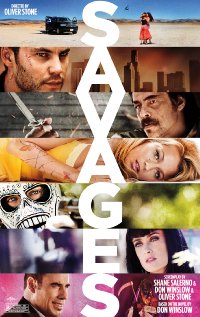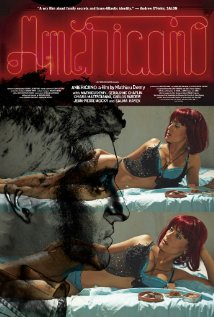 Savages/2012/Universal/130 min.
Savages/2012/Universal/130 min.
Without giving too much away, Blake Lively’s character in “Savages,” Oliver Stone’s latest neo noir, is forced to, um, live rough for the sake of a business deal gone brutal. Still, this doesn’t stop the quintessential, sun-kissed beach blonde named O (short for Ophelia) from asking her keepers: “Do you think I could get a salad once in a while instead of pizza?”
O, with her lean limbs, long hair and dazzling smile, is a gorgeous if slightly vacuous pawn in this story, which she also narrates. The movie’s biggest strength is that Lively and the rest of the cast so effortlessly inhabit their characters.
The power brokers are her luscious boyfriends Ben (Aaron Johnson) and Chon (Taylor Kitsch); she’s involved with both of them and, even if she’s not the sharpest tool in the shed, she deserves a little credit for that nifty set-up. Ben’s a Buddhist who studied business and botany; Chon’s a baddist, as O puts it, and a former Navy SEAL. Together, they’ve built a thriving marijuana biz that catches the eye of a major Mexican cartel run by Elena (Salma Hayek) and Lado (Benicio Del Toro).
Lado is a badass assassin type with an abundance of fluffy hair and Elena puts her steely focus steadfastly on the bottom line. For Lado, that means bringing Ben and Chon on Elena’s board of directors, as it were. Ben and Chon don’t take kindly to hostile takeovers, however, and they aren’t afraid to fight back. (Not sure who runs the cartel’s IT department but it’s eminently capable of providing video footage of hideously violent acts with nary a glitch or file not found.) John Travolta plays Dennis, the corrupt cop.
Stone has lined up the perfect players (Hayek, Del Toro and Travolta have the meatiest parts) for an entertaining, extremely violent, sometimes-funny tale, based on Don Winslow’s novel, of savage “execs” and what they’ll do to keep making enormous gobs of illegal cash. (Stone co-wrote the script with Winslow and Shane Salerno.) Diced and sliced with kinetic editing, and drenched in the piercing bright light of Southern California, the story unspools with Stone’s trademark acuity and intensity.
But there are essentially two endings and the final “real” one strikes me as a mistake. I wish Stone, given his typical hard edge, had not felt the need to close on a sunny note when the bleaker, darker ending would have better fit this bold neo noir that throughout wears blood and guts on its sleeve.
“Savages” opens nationwide today.











From FNB readers